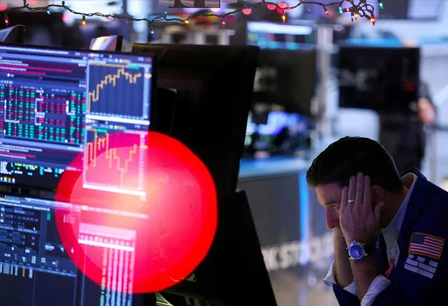Wall Street is baffled by this economy.
The labor market is thriving. US unemployment is at its lowest level since 1969. GDP and retail sales indicate that the economy is still expanding.
Yet US manufacturing has likely already contracted into a recession, housing sales have plummeted, tech layoffs keep coming and corporate earnings growth is souring.
So is the US economy heading towards a soft or hard landing? Or maybe no landing at all?
While the broader economy has thus far escaped a National Bureau of Economic Research-designated recession, various segments have experienced their own cool downs and some economists say this perplexing phenomenon is the product of a “rolling recession.” That’s when an economic downturn sweeps slowly across the economy, impacting sectors one by one.
“A rolling recession — where various sectors of the economy take turns contracting rather than simultaneously — is in progress,” wrote Sung Won Sohn, professor of finance and economics at Loyola Marymount University and chief economist of SS Economics, in a note last week.
What’s happening: During Covid lockdowns, money was funneled into the goods sector because there was very little access to services as consumers quarantined in their homes. Then, as the economy reopened, pent up demand caused a huge surge in services.
That created “pockets of weakness in many categories on the goods side, certainly in housing, that are definitely in recession territory,” said Liz Ann Sonders, chief investment strategist with Charles Schwab. The economy hasn’t fully retrenched because “we’ve had the offsetting strength on services,” she said.
“We continue to think the economy will suffer from rolling recessions, evidenced by the fact that corporate earnings growth is now entering its downturn,” wrote Sonders in a note on Wednesday.
So far, about 42 S&P 500 companies have issued negative earnings guidance for the first quarter of 2023, while just eight have issued positive guidance. About 69% of reporting companies missed analysts’ expectations for the last quarter, according to data from Refinitiv.
Getting active: So how do investors navigate a rolling recession?
“With a shrinking number of companies maintaining strength on the bottom line, investors should keep their focus on segments of the market that are high-quality in nature—namely, those with positive earnings revisions, healthy profit margins, and strong balance sheets,” said Sonders.
Active investing is a good strategy right now, wrote Jill Carey Hall, a Bank of America strategist, in a note on Tuesday. For five straight weeks, the bank’s clients have been big buyers of individual stocks and sellers of ETFs, she wrote. The spread between single stock and ETF flows so far this year is the widest ever since the Great Recession in 2008, she said.
Active investing is better than passive and putting money in an “outdex” — a catchy phrase for an actively managed portfolio with stock picks based on quality — is better than an index this year, she wrote.
Disney, Uber and Google: What investors are watching
▸ Disney announced it would eliminate 7,000 jobs on Wednesday as CEO Bob Iger seeks to save $5.5 billion in costs.
The cuts come as the company announced better-than-expected financial results. Disney revenue in the quarter rose 8% to $23.5 billion, edging past estimates of $23.4 billion from analysts surveyed by Refinitiv.
Iger also took steps to reward shareholders, while Disney employees will feel pain from the jobs cut announcement. The company, which had suspended its dividend payments during the pandemic, plans to resume them, Iger said.
“Now that the pandemic impacts to our business are largely behind us, we intend to ask the board to approve the reinstatement of a dividend by the end of the calendar year,” he said. “Our cost-cutting initiatives will make this possible. And while initially, it will be a modest dividend, we hope to build upon it over time.”
Shares of Disney jumped 8% in after-markets trading following the announcement of cost cutting and the return of the dividend.
▸ Silicon Valley is largely sitting still this earnings season, while Uber is zooming ahead.
The ride-hailing giant on Wednesday reported strong revenue growth in the final three months of last year, defying a slowdown that has pummeled much of the tech sector.
The company reported revenue of $8.6 billion for the quarter, beating Wall Street’s estimates and marking a 49% increase from the prior year. In a statement with the results, CEO Dara Khosrowshahi called it the company’s “strongest quarter ever.”
A surge in ridership was behind the rapid growth, he added. Trips during the fourth quarter hit 2.1 billion, an all-time quarterly high that translates into approximately an average of 23 million trips per day, he said.
Uber expects that growth to continue in the current quarter, forecasting that gross bookings would grow between 20% to 24% from the prior year. In a statement with the results, CFO Nelson Chai said the company is set up “for yet another record year.”
Shares of Uber closed Wednesday 5.5% higher.
▸ Shares of Google parent Alphabet plunged 7.7% on Wednesday, wiping $100 billion off the company’s market value, after its much-hyped new AI chatbot tool Bard misfired in a public demo this week.
In the demo, which was posted by Google on Twitter, a user asks Bard: “What new discoveries from the James Webb Space Telescope can I tell my 9 year old about?” Bard responds with a series of bullet points, including one that reads: “JWST took the very first pictures of a planet outside of our own solar system.”
According to NASA, however, the first image showing an exoplanet – or any planet beyond our solar system – was actually taken by the European Southern Observatory’s Very Large Telescope nearly two decades ago, in 2004.
The blunder triggered investor fears that Google risks damaging its reputation as a reliable source of information as it races to integrate the same AI technology that underpins Microsoft-backed ChatGPT into its core search engine.












